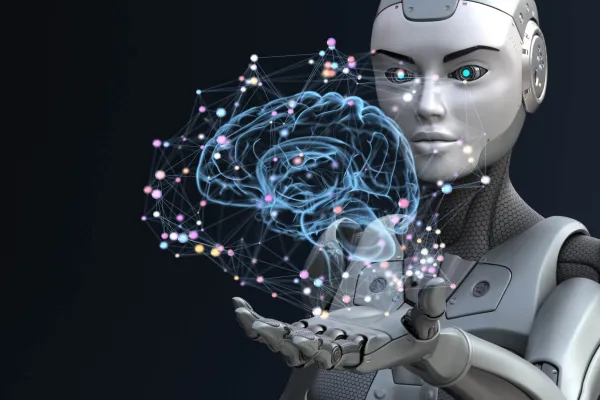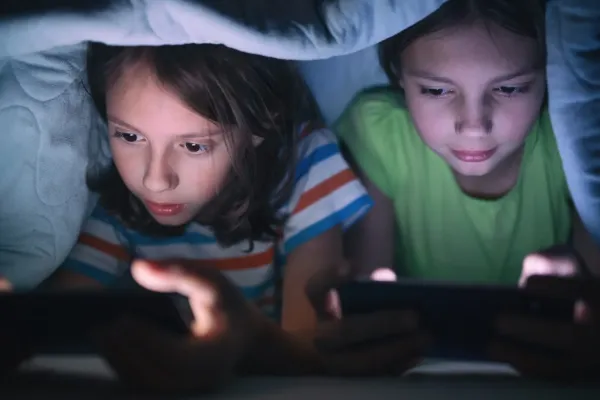
 Details
Details
When will AI replace our jobs?
For those who make our living with words, it’s a question that can strike fear into our hearts – especially since the arrival of ChatGPT. OpenAI's chatbot was launched for public use in November 2022 and quickly became the fastest-growing app in the world. Some 100 million people were using ChatGPT as of January 2023, a number that will only continue to rise.
In the marketing world, the arrival of ChatGPT and other AI programmes has been met with a mixture of fascination and dread. While its uses are still being discovered and fine-tuned, it's clear that AI is going to become a valuable tool in every marketer's toolbox moving forward. It can speed up tedious tasks like research and data analysis, it can automate social media management and email marketing and it can generate headline ideas and copy that, while not perfect, is pretty damn good. Likewise, AI-powered design tools like Midjourney and DALL-E can create eye-popping images based on text prompts while programmes like Canva and DeepArt can help users create professional-grade graphic design projects with minimal effort.
While this is all undeniably exciting, it can also be a bit scary. If AI can turn anyone into a copywriter or graphic designer, what does that mean for those of us already working in these fields?
It’s something that has been earnestly discussed for some time now, but marketing consultant Jason Miller thinks our jobs are safe for the foreseeable future. Why? Because we humans still have a key advantage over AI programmes, one that is particularly relevant to the worlds of marketing and advertising.
“AI has sort of an Achille’s heel when it comes to creativity,” Miller tells the Native Advertising Insitute. “Creativity has to come from a human. AI can only analyse observable data. Whatever you put into it is all it has to work with, whereas we humans have life experiences, we have feelings, we have thoughts, we have imagination. These are things that are truly human, and that's what fuels the creativity that separates us.”
Creativity as a teachable skill
If you don’t consider yourself a naturally creative person, Miller’s words may not give much solace. But he argues that creativity is like any other human talent in that it can be taught and learned.
“Although creativity is not a technical skill related to a specific task, tool or role, it is most definitely a skill,” Miller says. “It can be developed, practised and enhanced. And if we want to thrive as marketers in the age of AI, that’s exactly what we need to do.”
Miller argues that creativity is quickly becoming marketers’ “unique selling point in the age of AI”. He’s not alone in his thinking. The World Economic Forum identified “creativity, originality and initiative” as the third most important skill for the future. The demand for human creativity means that we should be finding ways to use AI to take care of some of the more mundane tasks so that we can set our imaginations free, Miller says.
“I think the important thing is to not look at machines as competitive but look at how we can collaborate with them. How can AI play a role in automating things and analysing mass sets of data so that we can focus on being more creative? You can use AI to help amplify and boost creativity but the heart and soul of the creativity has to come from a human.”
As an example of how advertisers can view AI as a partner rather than a competitor, Miller points to a 2018 ad from Lexus that used a script written by IBM’s supercomputer Watson that was then brought to life by film director Kevin Macdonald. At the release of the ad, IBM Watson spokeswoman Reece Medway described it as “an example of how man and machine will collaborate in the AI era.”
Silence your inner critic and unleash creativity
Miller has served as Head of Brand for Microsoft Advertising and Group Marketing Manager at LinkedIn, among other previous roles. He’s currently the head of brand and content at Tyk in addition to being a concert photographer and the author of two marketing books.
“I feel like my entire career has been built around a creative mindset,” he says.
But even someone who describes himself as a “slayer of mediocrity” tells us that he often has to overcome his own “inner critic”. He says that finding ways to silence that voice is one of the best ways to unleash creativity.
His other tips are to recognize the value of your own creativity and to use AI to seek out constraints. The latter may sound counterintuitive, but Miller argues that not only do constraints spur creativity, but the more unreasonable those constraints are, “the greater likelihood of them producing a breathtakingly original piece of work.”
“It’s a common assumption that creativity needs space and freedom, but nothing could be further from the truth,” he says. “Seek out and pile on constraints and you find that creative thinking flourishes in the space between them. The algorithms will tell you what the optimal video length is, how long a subject line should be, what time to send that email and what topics you should be creating content around – but the delivery remains up to you.”
Miller’s parting advice for native advertising pros in the age of AI is to make sure to “always leave space for the big idea or to try something new.”
“Seventy percent [of your time should be used to] get it done, keep the trains on time, keep the leads coming in and keep the brand awareness going,” he says. “But save that 20 to 30 percent for a big idea, an intelligent risk, something that's different, something that's unexpected, something that's bold. We all want to be better storytellers, but we rarely take the opportunity to actually do so.”
If you don't want to take Miller's word on your place in an AI-powered world, you can always go straight to the source. We asked ChatGPT how marketers should feel about their future prospects.
"While it's true that AI has the potential to automate some aspects of marketing and copywriting, it's unlikely that these professions will be completely replaced," it wrote. "AI can assist with tasks like data analysis, generating headlines, and even drafting some basic copy, but it still lacks the creativity, nuance, and strategic thinking that human marketers and copywriters bring to the table.
"Rather than freaking out, people working in these fields should focus on developing skills that complement and enhance the capabilities of AI. This could include honing their creative and strategic thinking, developing expertise in emerging technologies, and staying up-to-date with the latest trends and best practices."
This article was originally published on 3 October 2022, shortly before ChatGPT took the world by storm. It was updated on 28 March 2023.





